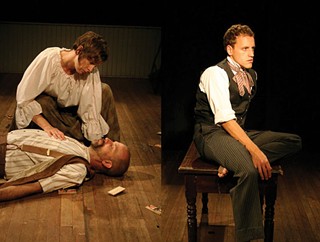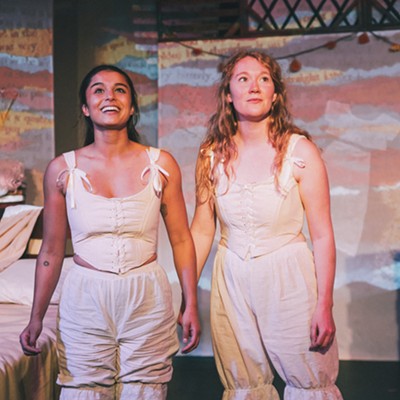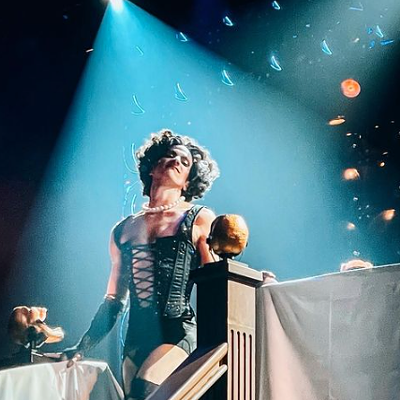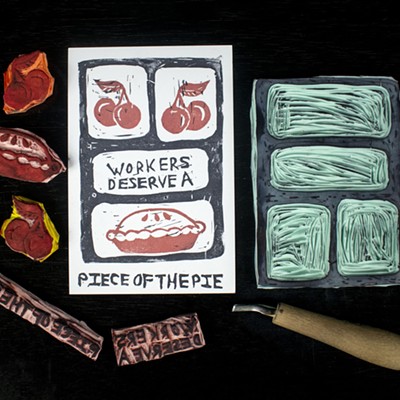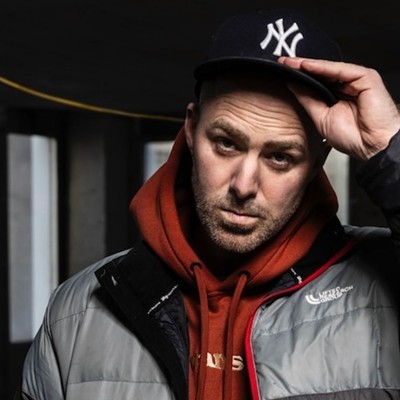"There's not enough to share around," says Ben Stone. He's talking about space, permanent performance venues. His company---founded in 1999 as Zuppa Circus, now known as Zuppa Theatre Company---has utilized venues large (the Halifax waterfront) and small (North Street Church). Other than Neptune's two stages, Fountain Hall (occupied by the company) and the studio(beautiful, but pricey) there is scant permanent space. The Bus Stop Theatre on Gottingen and Theatre Nova Scotia's space on Agricola are constantly full, but as far as affordable rooms to rent go---we're not even talking sound and lights yet---they're it. "And that's just the theatre community," says Stone. "There's the dance community, and the music community."
Space is an issue for any artist, in all towns but especially this one, where rents are high and vacancies are not. And it's always been that way---independent theatre companies in the city have had to make do with bedroom readings, schedule bartering and budget stretching---and, in the case of Shakespeare by the Sea, weather---just to rehearse in the spaces from which they present theatre, never mind the actual productions. DaPoPo Theatre has staged shows on the ferry and in restaurants. Howard Beye, who built the Bus Stop, put on a production of Eric Bogosian's SubUrbia in the parking lot of the Needs on Connaught. SBTS's entire existence has been spent in Point Pleasant Park's forests and structures, with occasional forays onto other sites, like the courthouse on Spring Garden Road.
In 1999, Eastern Front Theatre moved into Alderney Landing, its home until this year. "We'd been itinerant, like everyone else," says Mary Vingoe, its artistic director from 1993 to 2002. "We'd been at the Dunn, then the Neptune Studio. We'd done On the Waterfront actually on the waterfront, at the Alderney Gate Library and the old Dartmouth museum. One year we used the Maritime Museum of the Atlantic, one year we used an old grocery store, whatever we could find. Whether we like it or not, audiences identify with buildings. We as artists may not like that, but it gave us a sense of stability---we had arrived, we were more than just a bunch of artists doing work. We were an actual company that could develop shows and impact the community the way that Neptune could, because we had a home."
2B Theatre began life as Bunnies in the Headlights in 1999, producing its earliest shows at the Atlantic Fringe Festival and DANSpace-on-Grafton. Across the decade, the company has staged shows at the Bus Stop (November's East of Berlin), Citadel High's cafeteria (Revisited) and Neptune Studio (Manners of Dying, Invisible Atom). Run by Christian Barry and Anthony Black, 2B works with the space challenge.
"One of the major virtues has always been our flexibility," says Barry. "It's always been vital to have two of us in the drivers' seat---one can go away and know the company is in good hands. That's still important. Ten years on, we don't have a huge infrastructure or a huge office or, for that matter, a building. We don't want a building---once you have a building you have to clean the toilets. Part of our nomadic existence has been visible in coming and going from Halifax, but also coming and going in different venues in Halifax. We choose the space that we think is going to fit this production." But: "I still think we're in need of a space to build momentum for our audiences, the need to have a centre, a nexus point for Halifax audiences to know where theatre is happening."
"If you build the space, people and work gets made. You do need a space to centralize things," says Dustin Harvey. "Space is a symbol and metaphor---if the city has a space for theatre, the city is saying, 'We have a space for you,' and artists believe they belong a little bit."
That said, Harvey's outfit, Secret Theatre, has built its name through non-traditional staging, like its all wind-up toy version of Waiting for Godot---Winding Up Godot was staged at The Crib, the performance space in the back of Shahin Sayadi's (Onelight Theatre) now-defunct Persian Bazaar. "I remember hiding behind those curtains with the other actors, peeking through the cracks, wondering if we're selling out," says Harvey, "which for me is a funny joke because the place could only seat 20 or something." That show, which got a cease-and-desist from Samuel Beckett's estate---"There was no way we would make money off the show, so for them to sue us based on the idea that we would profit off using their information, and we only had 10 minutes of Waiting for Godot in the show, it spoke to the whole theatre establishment"---was one of the few times Harvey has used a theatre space. His Cowboy Show took place inside a camping trailer.
"What we came up with was this idea of theatre for small audiences---if we did a show for 15, could we do a show for eight?" he says. "We made that show based on this idea of spectacle, what is spectacular performance. That was a show we did one time only in a trailer in the parking lot of the Bus Stop. And we got a notice from HRM to remove our trailer---it was an eyesore, we got this citation. So we shrouded the whole thing in blue canvas and had a sign on it that said Theatre Set. It was an old '50s trailer that a tree fell on from Hurricane Juan, it wasn't livable, so we thought, 'Let's put eight people in it and call it a theatre.'"
"Let's call it a theatre" has worked in the past and will have to work for the foreseeable future. Zuppa Circus will stage Penny Dreadful "in the Uniacke Room at the Halifax Club in February. We think it's sort of a direction we wanna go," says Stone. "The new show we're writing is called Five Easy Steps to the End of the World, and we want to find a non-traditional venue where we can create a pre-apocalyptic salute to the world."
Barry sees the scene's current vitality as a direct result of "the commitment of these companies, to building things from the ground up and to stay here. All of us have gone away for a little bit," he says, but "there's been a commitment from Onelight, 2B and Zuppa to really make a go of it here, to make theatre in the city where we want to live, rather than going to where they make theatre and being forced to live in a city."
"When you look at who's at the Bus Stop this year, it's incredible! Everybody and their dog is producing at the Bus Stop!" laughs Vingoe, who directs Colleen Wagner's Home there this year. "People are doing whatever it takes to make it happen."
Tara Thorne began writing for The Coast in 2000.

